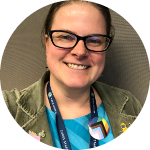How does someone make the leap from learning R to actively applying R in professional work? At what point (if ever!) do we get to call ourselves “experts in R?
This talk explores what differentiates novice, practitioner, and expert R programmers, and how transitions between these stages occur. I’ll discuss the type of support required for R users to move from one level of expertise to the next, and how different types of training and documentation can support R users at each level.
Understanding variable levels of education among R practitioners supports our own professional work, from collaborative coding to package development, and helps build a bigger, more inclusive R community.

Kate Hertweck is the bioinformatics training manager at Fred Hutchinson Cancer Research Center, where they develop and teach courses on reproducible computational methods as a part of fredhutch.io. Kate's graduate training at University of Missouri in genomic evolution of plants was followed by a postdoctoral fellowship at the National Evolutionary Synthesis Center (NESCent) at Duke University, where they fell in love with R and began working exclusively in computational biology. Kate then spent four years as an assistant professor teaching bioinformatics, genomics, and plant taxonomy before transitioning to biomedical research training. Kate has been involved in The Carpentries, a non-profit organization that teaches reproducible computational methods, since 2014, serving as a leader in community governance since 2016. When not being an overenthusiastic instructor, Kate likes to spend their time doing fiber arts (knitting, crochet) and enjoying all things science fiction.